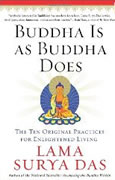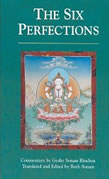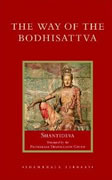Ten Paramitas (Dasa Paramiyo) or Six Paramitas
Buddha Is as Buddha Does: The Ten Original Practices for Enlightened Living
By Lama Surya Das. HarperOne, Reprint Edition, 2007. 288 pages. VSCL.
Buddhism: Reading List, Bibliography, Resources, Links
How to Live the Good Life: Advice from Wise Person
Kindness and the Heart in Yoga
Living Kindness: The Buddha's Ten Guiding Principles for a Blessed Life
By Donald Altman. Oregon City, Oregon, Moon Lake Media, 2003.
Bibliography, notes, 230 pages. VSCL.
The Mind of Clover: Essays in Zen Buddhist Ethics
By Robert Aitken. North Point Press, 1984. 202 pages. VSCL.
The Practice of Perfection: The Paramitas from a Zen Buddhist Perspective
By Robert Aitken. Counterpoint Press, 1997. 240 pages.
The Six Perfections: Buddhism and the Cultivation of Character
The Six Perfections
Commentary by Geshe Sonam Rinchen. Translated and edited by Ruth Sonam.
Ithaca, New York, Snow Lion
Publications, 1998. Notes, 158 pages. VSCL.
Waking Up to What You Do: A Zen Practice for Meeting Every Situation with Intelligence and Compassion.
By Diane Eshin Rizetto. Foreword by Charlotte Joko Beck. Boston,
Shambhala, 2005. Notes, 197 pages. VSCL.
The Way of the Bodhisattva
By Shantideva. A translation of the Bodhicharyāvatāra.
Revised Edition. Translated from the Tibetan by the Padmakara Translation Group.
Boston, MA, Shambhala, 2008. Bibliography, notes, 361 pages.
Shantideva was an 8th century Indian Buddhist scholar at Nalanda
University. VSCL.
Return to the Index for this Webpage
Quotations
The Ten Paramitas, Six Paramitas, Four Immersurables
"Rahula, practice loving
kindness to overcome anger. Loving kindness has the capacity to bring
happiness to others without demanding anything in return.
Practice compassion to overcome cruelty. Compassion has the capacity to
remove the suffering of others without expecting anything in return.
Practice sympathetic joy to overcome hatred. Sympathetic joy arises when one
rejoices over the happiness of others and wishes others well-being and
success.
Practice non-attachment to overcome prejudice. Non-attachment is the way of
looking at all things openly and equally. This is because that is. Myself
and others are not separate. Do not reject one thing only to chase after
another.
I call these the four immeasurables. Practice them and you will become a
refreshing source of vitality and happiness for others."
- The Buddha
"The Large Sutra on Perfect Wisdom claims that the
Six Perfections are "bases for training."
This means that they constitute a series of practices or "trainings" that
guide practitioners toward the goal of enlightenment or awakening.
These six "trainings" are the means or methods to that all-important end.
But the perfections are much more than techniques. The are also the
most fundamental dimensions of the goal of enlightenment.
Enlightenment is defined in terms of these six qualities of human character;
together they constitute the essential qualities of that ideal human state.
The perfections, therefore, are the ideal, not just the means to it.
Being generous, morally aware, tolerant, energetic, meditative, and wise is
what it means for a Buddhist to be enlightened. If perfection in these
six dimensions of human character is the goal, the enlightenment, understood
in this Buddhist sense, would also be closely correlate to these particular
practices. Recognizing this, one sutra says, "Enlightenment jus is the
path and the path is enlightenment: To be moving along the path of
self-cultivation by developing the
Six Perfections
is the very meaning of "enlightenment.""
- Dale S. Wright, The Six Perfections, p. 4
"Here, monks, a disciple dwells pervading one direction with his heart filled with loving-kindness, likewise the second, the third, and the fourth direction; so above, below and around; he dwells pervading the entire world everywhere and equally with his heart filled with loving-kindness, abundant, grown great, measureless, free from enmity and free from distress.
Here, monks, a disciple dwells pervading one direction with his heart filled with compassion, likewise the second, the third and the fourth direction; so above, below and around; he dwells pervading the entire world everywhere and equally with his heart filled with compassion, abundant, grown great, measureless, free from enmity and free from distress.
Here, monks, a disciple dwells pervading one direction with his heart filled with sympathetic joy, likewise the second, the third and the fourth direction; so above, below and around; he dwells pervading the entire world everywhere and equally with his heart filled with sympathetic joy, abundant, grown great, measureless, free from enmity and free from distress.
Here, monks, a disciple dwells pervading one
direction with his heart filled with equanimity, likewise the second,
the third and the fourth direction; so above, below and around; he
dwells pervading the entire world everywhere and equally with his heart
filled with equanimity, abundant, grown great, measureless, free from
enmity and free from distress."
- The Buddha, from the Buddhist Scripture Digha Nikaya 13
"The Six
Perfections, or paramitas, are guides for
Mahayana Buddhist
practice. They are virtues to be cultivated to strengthen practice and bring
one to enlightenment. The Six Perfections describe the true nature of
an enlightened being, which is to say they are our own true nature. If they
don't seem to be our true nature, it is because the perfections are obscured
by our delusion, anger, greed, and fear. By cultivating these perfections we
bring this true nature into expression. There are three different
lists of paramitas in Buddhism. The Ten Paramitas of
Theravada Buddhism were
gleaned from several sources, including the
Jataka Tales. Mahayana
Buddhism took a list of Six Paramitas from several
Mahayana Sutras,
including the
Lotus Sutra and the
Large Sutra on the Perfection of Wisdom (Astasahasrika Prajnaparamita).
In the latter text, for example, a disciple asks the Buddha, "How many bases
for training are there for those seeking enlightenment?" The Buddha replied,
"There are six: generosity, morality, patience, energy, meditation, and
wisdom." Prominent early commentaries on the Six Perfections can be
found in Arya Sura's Paramitasamasa (ca. 3rd century CE) and
Shantideva's Bodhicaryavatara ("Guide to the Bodhisattva's Way of
Life," 8th century CE). Later, Mahayana Buddhists would add four more
perfections -- skillful means (upaya),
aspiration, spiritual power, and knowledge -- to make a list of ten. But the
original list of six seems to be more common."
- Barbara O'Brien
"The Sanskrit word pāramitā has numerous meanings. 1. Derived from the words pāram meaning "the other side" and the past participle ita "gone", meaning "gone on to the other side," or "crossed over to the other side," or "become a changed person." 2. The word pārama which means "excellent," "supreme," "highest, "best." 3. A Buddhist technical term meaning the highest character traits associated with an enlightened heart-mind, practices for becoming enlightened, the virtues of a Bodhisattva."
The Essence of the Ten Transformative Practices
"Generosity
arises from unselfishness and nonattachment.
Ethics involves virtue, integrity, and self-discipline.
Patience requires resilience, acceptance, and fortitude.
Effort means courage in joyous perseverance.
Meditation implies mindfulness, concentration, reflection, and
introspection.
Transcendental wisdom includes discernment and self-knowledge.
Skillful means arise from resourcefulness and imagination.
Spiritual aspirations include noble intention and resolve.
Higher accomplishments require leadership, powers, and positive
influence.
Awakened awareness means pristine realization.
These are the ten arms and legs of the radiant body of the Bodhisattva,
Whose heart is Bodhicitta, selfless love and compassion.
-
Buddha Is as Buddha Does: The Ten Original Practices for Enlightened Living
By Lama Surya Das, 2007.
Return to the Index for this Webpage





